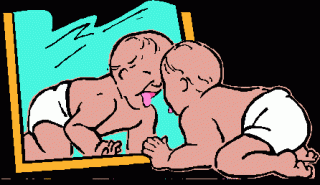Parenting: Self Awareness
by Harald Breiding-Buss
One of the most exasperating things about toddlers is their incredible and stubborn self-centredness. It is an ongoing source of frustration for parents, and easily misunderstood as defiance.
However, the compassion and empathy for others we’d like to see in our children can only come from an awareness of their own self. Self-awareness is something so natural and normal to us that we tend to forget that we share it with only a handful of other species on Earth, and that it is not something we are born with. Being self-aware also makes it very hard to imagine a state where you are not—yet this is what defines a child under about two years of age.
A cat or a dog will not be able to recognise its own reflection in the mirror, relate to a video recording of itself, or have any idea about its similarity to other cats and dogs. They don’t know what they are, only that they are. They are the centre of the world, which only exists for the purpose of having them in it.
Which is just like your toddler. If they want something they cannot comprehend why anyone would not want them to have it, which is why they may get angry if you don’t give it to them. If they hurt you—by biting or pulling your hair—they do not know that you feel pain as they do. You cannot teach them that by biting back—all you would do is making the consequence of their behaviour so unpleasant that they will not do it again. As far as the toddler is concerned your biting them has nothing to do with them biting you other than one seems to have lead to the other.
Self-awareness develops gradually through the first 2 1/2 or so years of life, but there are two distinct recognisable stages. The first stage is awareness of physical independence, which sets in at around 6-10 months. This is when babies realise that when dad or mum leave the room they are alone. They learn that people are physically independent beings that can come and go.
This realisation brings on stranger and separation anxiety: before, baby would be happy in just about anybody’s arms. Now, they may cry at a strange face or at least need some time to get used to it before getting close. They may also start to show discomfort when dad and mum leave the room—they realise that people are independent, but they haven’t yet learned that things or people can be out of view and still exist.
True self-awareness sets in some time around 18 months, and is often accompanied by a phase of growing ‘clinginess’. Over the next few months your toddler will start to call himself by the same name as images of himself, which before he will usually have given different names (although the difference may have been subtle enough that it escaped your notice). He will start using words such as ‘me’, ‘my’, or ‘mine’. This indicates that he now understands that he better lay claim to an object because it cannot automatically be assumed to be his.
Although toddlers will start to understand that other people are just like them, with feelings of their own, it will take another year before they can cooperatively play with other children and learn a concept such as ‘taking turns’. Starting to use personal pronouns such as ‘I’ and ‘you’ are one indicator that toddlers are ready to play with others.
So, what does this mean for parenting?
It does not mean that you should simply let your toddler’s behaviour go because they don’t know yet what they are doing. Even though they can’t yet understand the impact of what they are doing on others, they do understand routines and cause-and-effect.
Just as they can learn that when they push a button on a toy a sound will come, they can learn that when they throw food from their high chair they will be removed from it and the food taken away. Whether they like or understand it doesn’t come into it. You are teaching them the concept of ‘rules’, and failing to do so when your toddler is young will make your job a lot harder when you head into the third year of their lives. In general, action is understood better than words at this age.
There should only be a small number of rules for such young children: 3-5 will do. And it is important that the consequence for breaking each rule is always the same, and is enforced 100% of the time. It is better to have 3 rules consistently enforced than 20 that you can only enforce sometimes. For the rest of tot’s ‘infringements’, use distraction or simply removal from the situation.
You will have to be prepared for your toddler to sometimes deliberately ‘break’ a rule, not to test you, but because this cause-and-effect learning is extremely interesting to him. If he can do something that makes you respond (such as saying ‘no’ to him), that’s as good as any toy with sound.
To help the development of self-awareness on the way you should start describing your own features and feelings in the same words as you describe his. ‘Daddy’s fingers’, ‘Daddy is happy’ and so on. Do anything that makes them understand you are as much a human being as they are.





